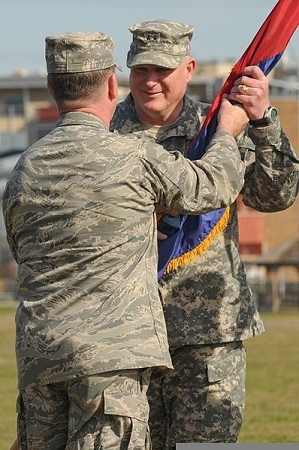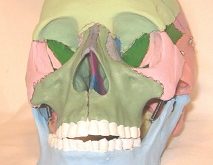Noun: aide-de-camp
Pronunciation:(‘eyd-du’kamp)
Aide-de-camp meaning:
- (military) an officer who acts as military assistant to a more senior officer
Synonyms: adjutant, aide
Derived forms: aides-de-camp

Quotations:
- Carol Wallace – But the strict rules of precedence produced much odder situations: fathers taking their daughters in to dinner since the girls were the highest-ranking women there; young boys called down from the schoolroom to sit at the head of the table; a general yielding place to his aide-de-camp because the latter was a lord.
- Andrew Roberts – Men can be unjust towards me, my dear Junot, he wrote to his faithful aide-de-camp, but it suffices to be innocent; my conscience is the tribunal before which I call my conduct.
- Sarah Vowell – Washington was referring to his military family or aides-de-camp, the same way John Adams described the aide Alexander Hamilton as one of General Washington’s Family. So when Washington said family, he meant chummy minion. The orphaned Lafayette heard son.
- Brian Kilmeade – submit reports written in invisible ink, which now fell almost exclusively on Tallmadge to reveal and decipher. The job had previously belonged to Washington’s aide-de-camp Alexander Hamilton, while Tallmadge was in charge of making sense of the general intelligence and summary reports Woodhull, Roe, and Brewster compiled. But recently Tallmadge had been tasked with the white-ink letters perhaps after Washington recognized the urgency.
- William Garden – A single confidant and companion was all that he thought of—his armour-bearer, or aide-de-camp.
- William – Sir Benjamin then returned to Bavaria, and was appointed by the elector colonel of a regiment of cavalry and general aide-de-camp.
Sample sentences:
- So off had gone John to the wars again. But he had not remained for long in the position of a humble volunteer. Colonel Clifton, commanding the 1st Regiment of Dragoons, no sooner heard that Crazy Jack was back then he enrolled him as an extra aide-de-camp.
- Asked the boy to consider himself at all times as one of his family. Washington was referring to his military family or aides-de-camp, the same way John Adams described the aide Alexander Hamilton as one of General Washington’s Family. So when Washington said family, he meant chummy minion. The orphaned Lafayette heard son.
- Probably the first book that Hamilton absorbed was Malachy Postlethwayt’s Universal Dictionary of Trade and Commerce, a learned almanac of politics, economics, and geography that was crammed with articles about taxes, public debt, money, and banking. The dictionary took the form of two ponderous, folio-sized volumes, and it is touching to think of young Hamilton lugging them through the chaos of war. Hamilton would praise Postlethwayt as one of the ablest masters of political arithmetic. A proponent of manufacturing, Postlethwayt gave the aide-de-camp a glimpse of a mixed economy in which government would both steer business activity and free individual energies. In the pay book one can see the future treasury wizard mastering the rudiments of finance. When you can get more of foreign coin, the coin for your native exchange is said to be high and the reverse low, Hamilton noted. He also stocked his mind with basic information about the world: The continent of Europe is 2600 miles long and 2800 miles broad; Prague is the principal city of Bohemia, the principal part of the commerce of which is carried on by the Jews. He recorded tables from Postlethwayt showing infant-mortality rates, population growth, foreign-exchange rates, trade balances, and the total economic output of assorted nations.
- Then the short man disappears through the huge doors. Minutes later, the aide-de-camp flings open the shutters of an upstairs window and gazes a moment across the rooftops before unfurling a crimson flag over the brick and securing its eyelets to the sill.
- He exchanges a few words with a thin aide-de-camp, who translates to the mayor.
- His mission completed, he was ordered to return to Russia for the revolution of 1791, and now he served as aide-de-camp and Major-General.
- Before they reached it they met a general officer on horseback, cantering along accompanied by an aide-de-camp.
- Within an hour after my first call upon him he called with his aide-de-camp upon me at the Hotel Shepheard.
- I accompanied the aide-de-camp, and introduced him to the captain who received him with the joy of a soldier meeting a comrade.
- Accompanied the aide-de-camp, and introduced him to the captain who received him with the joy of a soldier meeting a comrade.
- Presently an aide-de-camp returned through an archway with the sheriff.
- Well, I took Flixton with me because I didn’t know Sir Robert and he did, and he’s supposed to be playing aide-de-camp to me.
- Another of the fortunate men who were privileged to be in the house for a season was Tench Tilghman, an aide-de-camp of General Washington.
- Sir R. Wilson had been aide-de-camp to Hutchinson’s uncle the general.
- The various items swelled to a vast amount, yet no remittance came – no aide-de-camp made his appearance.
- It seems there was some mistake in the orders brought by the aide-de-Camp of the Admiral of the Fleet.
- But a fine aide-de-camp he’s like to prove, if this is the way he treats me.
- At Dover we had found Lord William Seymour in uniform, with his aide-de-camp, wife and daughter waiting for us.
- He was not acting with his troop, but as the Colonel’s aide-de-camp.
- Mr. Bulkeley came to Halifax as Aide-de-Camp to Governor Cornwallis in 1749, and had twice administered the Government as Senior Councillor.
 Spinfold VisualDictionary-Evolutree- Technorip-Amazing Facts and much more.
Spinfold VisualDictionary-Evolutree- Technorip-Amazing Facts and much more.





